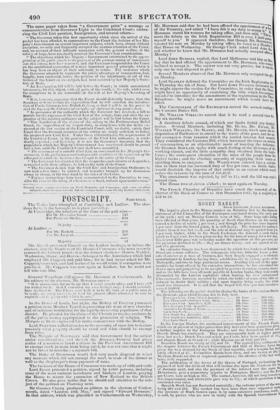In the liewe of Lords, last night. the Bishop of
Exi:TEN presentee-1 petition front 31erthyr TydviI, representing tint want of new churches and of religions instruction for the impielly-inere:'sing population of that district. 1 he pleaded for the claim of the Church to receive exclusively
all the pulite money is to the promotion of religion. 'The Marquis as' BuTs; expressed Isis entire concurrence with the Bishop.
Lord PORTMAN called attention to the necessity of some law to declare precisely what i,l'ol'erty should be rated all(' what should be exempt from rates, The Marquis of Non M A NE Y said that Government had the subject under consideraidni ; t'nfl though the Attorney- General had given notice of a motion to insert a clause in the Poor-law Amendment Bill to exempt stock in trade frosts being' rated, he was not sure that it might not be better to introduce a separate bill.
The Duke cif thetratoND would feel very much disposed to reject any measure wIsich did not exempt the stock in trade of the farmer as .well as the shopkeeper's from payment of rates.
The business of the House of Commons was made sup of odds and ends.
Lord ELIOT presented a petition, signed by 4,000 persons, including some of the most eminent merchants and bankers of London, prqing the House to secure the possession of New Zealand to the British Crown. He also gave notice that he should call attention to the sub- ject of the petition on Thursday next.
Sir Guoncis CLF.RK produced an address to the electors of Cocker. mouths, dated "London, 18th May," and signed "Edward Horsman," In that address, which was placarded in Cockermouth on Wednesday, I shall press. Mr. Horsman said that he had been offered the appointment of ns of the Treasury, and added "I have felt it my duty to accept it." Horsman stated his reasons for taking office, and then said, ment the debate on the Irish Registration Bill is or myself to you." It appeared therefore, that though Mr. Borsmantlyi vacated Isis seat on Monday by taking office, he vested as a Member.; that House on Wednesday. Sir George Clerk asked Lord Jobs pt"' sell whether he knew that Mr. Horsman had actually ores',
ofs
Monday ?
Lord JOHN RUSSELL replied, that Lord Melbourne told biro on 310n. day that he had Offered the appointment to Mr. llorsman, who seertio inclined to accept it. The answer was not very precise, but it wattle only one he was disposed to give.
Several Members observed that Mr. Horsman only accepted the on Monday.
Lord STANLEY deferred the Committee on the Irish Registration IA to Thursday the 4th of June. But Lord JoHN B ussim, intimated that he might oppose the motion for the Committee, in order that the Hoes might have an opportunity of examining the bills which Governme,t intended to introduce for the amendment of the registration in the Kim.;(loins : he might move an amendment which would, have It The CHANCELLOR of the EXCHEQUER moved the second reading oi the Customs Duties Bill.
Mr. 1.Nrinussi WssmAms moved that it be read a second time that day six months. A desultory debate ensued, of which our limits forbid any detaitsi notice. Several Members, including Mr. licstE, Mr. Ewsirr, WILLIAM WILLIAMS, Mr. SLANEY, and Mr. MusTz, dwelt upon the in- disposition of Parliament to attend to the wants of the poor, and them. fair exemption from taxation which the landed interest had secured, They considered the Customs Bill, which increased the taxes on articles of consumption, as an objectionable mode of meeting the deficiency, Sir GEORGE SINCLAIR spoke with much feeling of the distresses of the working classes, and the little sympathy they obtained from the Legis• Hum' ; the consequent alienation of the mass of the people from the
hieher ranks ; an 'ab
d the solute necessity of supplying their wants or en'abling them to emigrate. Mr. WARBURTON entered into a oink( tion to show that the increased duty of five per cent. on Baltic timber -would diminish tile imports of that article to an extent which would reduce the revenue by the sum of 135,412/.
The amendment was rejected, by 107 to 15; and the bill was nada second time.
The House rose at eleven o'clock ; to meet again on Tuesday.


























 Previous page
Previous page